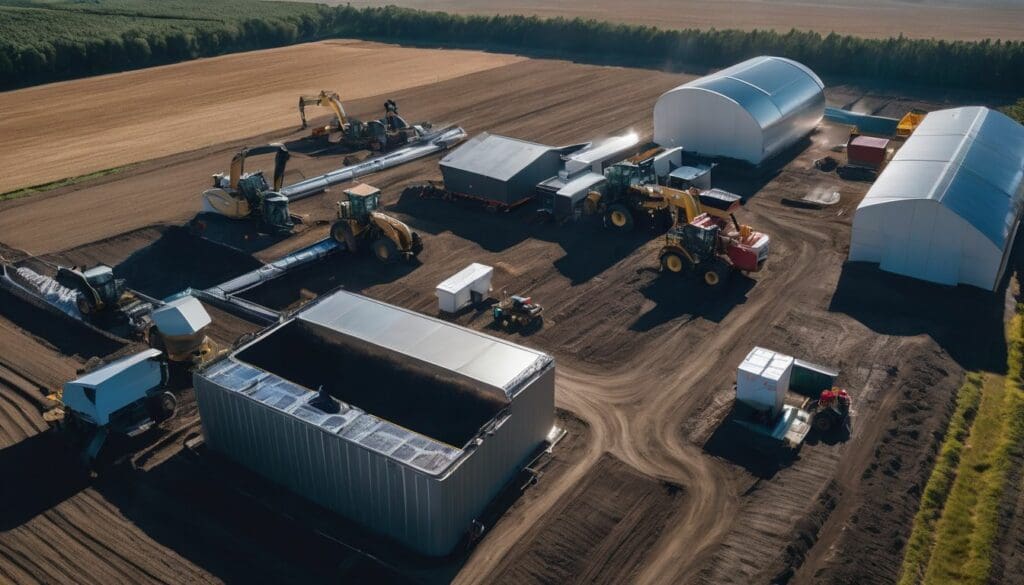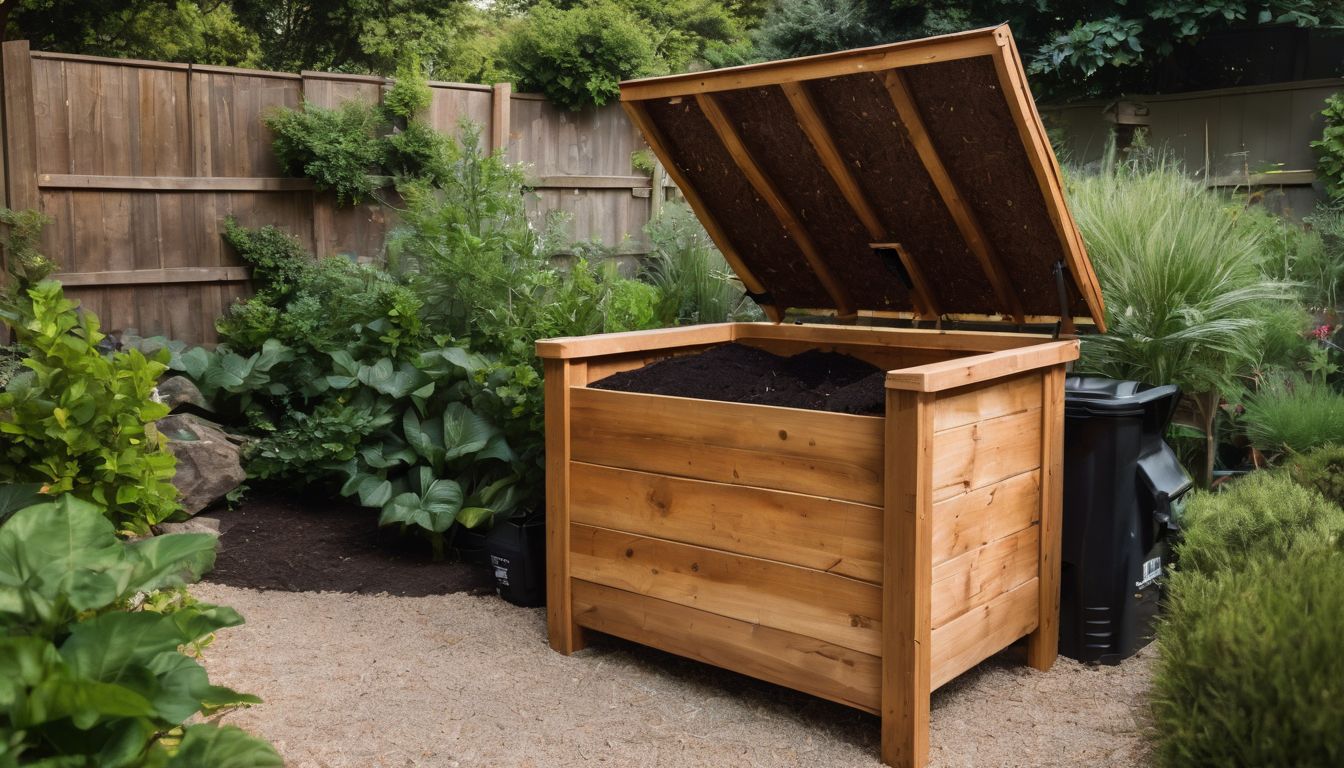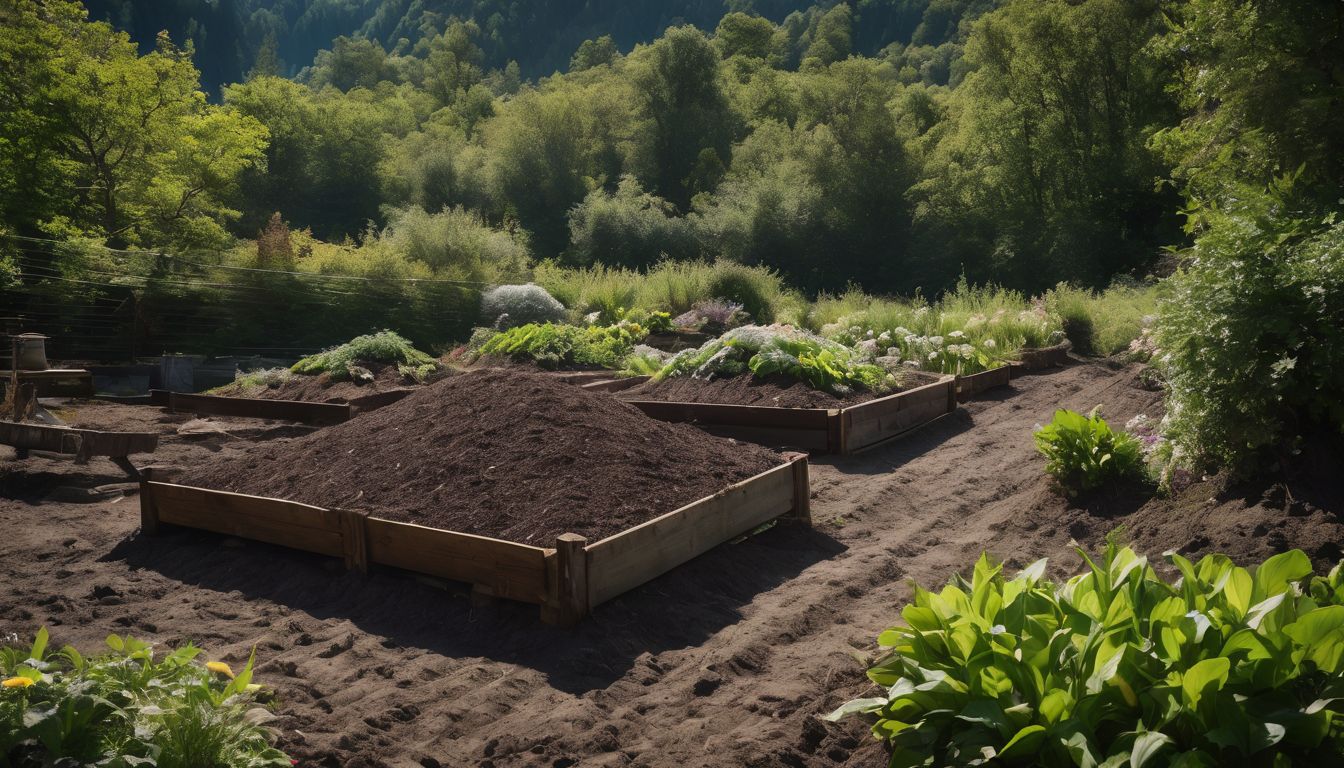As we strive to reduce our environmental footprint, the need for smarter composting solutions becomes increasingly critical. Every year, millions of tonnes of organic waste end up in landfills, emitting harmful greenhouse gases.
This article dives into cutting-edge composting technologies that promise a greener future by transforming waste management practices. Discover how these innovations could revolutionise recycling and keep reading to unearth the future beneath our feet!
Key Takeaways
- Biorefinery models are set to increase the value of organic waste by turning it into bioplastics, biochemicals, and biofuels, supporting circular economy goals.
- The inclusion of engineered biochar in composting helps improve soil fertility and carbon sequestration, leading to a reduction in greenhouse gas emissions.
- Black Soldier Fly larvae can accelerate organic waste decomposition while producing high-quality compost and diminishing the impact on climate change.
- Management strategies for antibiotic – resistant bacteria during composting are vital for creating safer end products and protecting environmental health.
Innovations in Composting Technology
Composting technology is constantly evolving with advancements in design, operation, and the use of additives, bulking agents, and microbes. These innovations play a crucial role in improving the efficiency and effectiveness of composting processes.
Design and operation advancements
Modern composting technology is rapidly transforming the way we recycle organic waste. Engineers are developing sleek, efficient systems that can turn food scraps and yard debris into nutrient-rich soil faster than before.
These advanced machines use less energy and process materials more thoroughly, resulting in high-quality compost with minimal environmental impact.
Smart sensors and automated controls have emerged as game-changers in the operation of these systems. They enable precise monitoring and adjustment of temperature, moisture, and aeration to optimise the composting process.
This level of control ensures that waste breaks down more consistently while cutting down on odours – a significant benefit for both urban and rural settings. The next section explores how groundbreaking technological developments further revolutionise our approach to sustainable waste management.
Technology development
Transitioning from design and operation advancements, the ongoing technology development in composting is enhancing the efficiency of organic waste management. Advanced composting techniques are playing a vital role in sustainable waste disposal methods while contributing to environmental conservation practices.
Innovations such as biorefinery models, engineered biochar, Black Soldier Fly treatment, and antibiotic-resistant bacteria management are revolutionising the future of organic waste treatment.
These developments align with circular economy initiatives by promoting nutrient recycling and renewable energy production through ecofriendly waste disposal.
Composting technology development is shaping the future of organic waste management with innovative approaches that cater to environmentally conscious individuals. The utilisation of advanced composting methods not only addresses food waste reduction but also paves the way for refining biomass residues and utilising biochar for end-product applications.
Role of additives, bulking agents, and microbes
In harnessing the potential of composting technology, the role of additives, bulking agents, and microbes is pivotal. These key components contribute to enhancing the decomposition process of organic waste.
Additives such as lime can help manage pH levels, while bulking agents like wood chips aid aeration and moisture retention in the compost pile. Additionally, microbes play a fundamental role in breaking down complex organic matter into nutrient-rich humus that enriches soil fertility.
Selecting appropriate additives and bulking agents helps optimise conditions for microbial activity during composting. The symbiotic relationship between these elements ensures efficient breakdown of organic waste into valuable resources for sustainable agricultural practices and environmental conservation efforts.
Sustainable Composting Principles
To achieve sustainable composting, it is crucial to maintain the right balance of moisture, oxygen, and temperature in the compost pile. This encourages microbial activity and speeds up decomposition.
Regularly turning the compost helps aerate it while mixing in organic materials ensures a proper carbon-to-nitrogen ratio for efficient breakdown. Effective management of bulking agents like wood chips or straw aids in creating air pockets within the compost pile, allowing beneficial microorganisms to thrive and break down organic matter effectively.
To ensure sustainability in composting, incorporating diverse feedstocks such as yard trimmings, food waste, and agricultural residues leads to nutrient-rich end products suitable for soil enhancement.
Furthermore, keeping contaminants out of the compost stream through careful waste sorting safeguards against toxic substances polluting the environment when using this natural fertiliser alternative.
Economic Evaluation and Business Models
Evaluate the importance of composting in a circular economy and explore techno-economic aspects with life-cycle assessments. Learn how businesses are embracing sustainable waste management practices for a greener future.
Read on to discover more about the economic benefits of composting technology.
Importance in circular economy
Composting technology plays a crucial role in the circular economy by transforming organic waste into valuable resources. It helps in reducing landfill waste, minimising greenhouse gas emissions and contributing to soil health through the production of nutrient-rich compost.
Furthermore, composting aids in closing the loop on food waste recycling by creating an environmentally friendly alternative to chemical fertilisers and promoting sustainable agricultural practices.
Implementing advanced composting technologies also supports waste reduction and recycling efforts while providing economic benefits through resource recovery, illustrating a commitment to environmental sustainability.
Techno-economics and life-cycle assessment
Transitioning from the importance of composting in a circular economy, it’s essential to consider the techno-economic and life-cycle assessment aspects. By assessing the economic viability and environmental impact of composting technologies, businesses can make informed decisions for sustainable waste management practices.
Life-cycle assessments provide valuable insights into the overall environmental impact of composting processes, considering factors such as energy consumption, greenhouse gas emissions, and resource depletion.
These evaluations play a crucial role in developing efficient business models that not only contribute to waste reduction and organic recycling but also align with sustainable goals.
Challenges and Opportunities
End-product applications, refining biomass residues, and the use of biochar present both challenges and opportunities in composting technology. To learn more about these exciting advancements in waste management, keep reading!
End-product applications
End-product applications encompass a wide range of possibilities, including the use of compost as a soil conditioner for agriculture, landscaping, and horticulture. It can also be utilised in erosion control and mine reclamation projects.
In addition to these traditional uses, innovative approaches are emerging, such as the incorporation of compost into biodegradable containers and packaging materials, contributing to sustainable practices in various industries.
Moreover, end-product applications extend beyond land-based activities; they include the potential utilisation of compost in stormwater management systems and green infrastructure projects to mitigate environmental impacts.
Refining biomass residues
To enhance composting technology, refining biomass residues is a crucial step. This process involves utilising advanced techniques to break down organic waste more efficiently. By optimising the decomposition of biomass materials, we can extract valuable resources like biochar, which has numerous applications in agriculture and environmental conservation.
Moreover, refining biomass residues helps to minimise the environmental impact of organic waste and contributes to sustainable waste management practices.
Implementing innovative methods for refining biomass residues allows us to create high-quality compost products that enrich soil health and promote sustainable agricultural practices.
Use of biochar
After refining biomass residues, the use of biochar stands as a promising solution for improving composting technology. Biochar, a form of charcoal derived from plant materials, is known for its ability to enhance soil fertility and sequester carbon.
Incorporating biochar into the composting process can help improve organic waste recycling by enhancing microbial activity and nutrient retention in the compost.
Additionally, engineered biochar with specific properties can further optimise the composting process by promoting better moisture management and reducing greenhouse gas emissions.
Future Trends in Composting Technology
In the near future, biorefinery models and the use of engineered biochar are expected to revolutionise composting technology. Additionally, treatment using Black Soldier Fly and management of antibiotic-resistant bacteria will play key roles in advancing sustainable composting practices.
Biorefinery models
Biorefinery models have emerged as a promising approach to optimise the value of organic waste in composting. These models integrate various processes such as anaerobic digestion, bio-oil extraction, and bio-based product synthesis.
By transforming biomass residues into high-value products like bioplastics, biochemicals, and biofuels, biorefinery models contribute to the sustainable management of organic waste while reducing reliance on non-renewable resources.
Incorporating biorefinery principles into composting operations not only enhances resource recovery but also aligns with the growing demand for circular economy practices. The use of engineered biochar and Black Soldier Fly treatment are key components within biorefinery models that continue to gain traction in driving efficient organic waste valorisation.
Use of engineered biochar
Engineered biochar is increasingly being utilised to enhance composting processes. By blending it with organic waste, the biochar aids in improving soil quality and carbon sequestration.
This sustainable approach contributes to reducing greenhouse gas emissions and enhancing the overall environmental impact of composting. The engineered biochar not only enhances the nutrient retention capacity of the soil but also promotes beneficial microbial activity essential for plant growth.
The use of engineered biochar presents a promising avenue in composting technology, aligning with trends in waste reduction and recycling. Its integration into composting operations supports environmentally conscious efforts by harnessing its potential as an effective soil amendment, ultimately contributing to eco-friendly agricultural practices and sustainable resource management.
Black Soldier Fly treatment
Black Soldier Fly treatment offers a sustainable solution for managing organic waste in composting. The larvae of the Black Soldier Fly consume organic matter, reducing the volume and converting it into nutrient-rich residue.
This process accelerates decomposition and produces high-quality compost. Additionally, using Black Soldier Fly larvae helps to reduce greenhouse gas emissions and minimises the need for traditional waste disposal methods, aligning with sustainable composting principles.
Furthermore, integrating Black Soldier Fly treatment into composting technology supports circular economy models by creating value from organic waste while promoting environmental conservation.
Antibiotic-resistant bacteria management.
Transitioning from the use of Black Soldier Fly treatment in composting, addressing antibiotic-resistant bacteria management is crucial for sustainable waste processing. It involves employing specialised techniques and robust monitoring to prevent the spread of antibiotic resistance during the composting process.
Implementing stringent protocols for handling organic waste can help mitigate the proliferation of antibiotic-resistant bacteria, ensuring a safer end product and contributing to environmental conservation efforts.
Incorporating effective strategies to manage antibiotic-resistant bacteria is imperative within composting practices. This approach aligns with the ethos of environmentally conscious individuals who advocate for responsible waste management and support initiatives aimed at preserving ecological balance.
Conclusion
Innovations in composting technology are shaping the future of sustainable waste management. Biorefinery models, engineered biochar, and Black Soldier Fly treatment are revolutionising the way we process organic waste.
The emergence of antibiotic-resistant bacteria management is also a promising trend in ensuring safe and effective composting practices. These advancements signify an exciting era for environmentally conscious individuals who support conservation efforts.
FAQs
1. What are the future trends in composting technology?
Future trends in composting technology include innovations for faster decomposition and more efficient waste management, such as vermicomposting advancements.
2. How does vermicomposting fit into modern composting techniques?
Vermicomposting uses worms to break down organic material, which can significantly speed up the composting process with recent advancements making it even more effective.
3. Will new technologies make composting easier for households?
Yes, with ongoing developments in composting tech, processes will become simpler and more accessible for everyday use at home.
4. Can advancements in composting help the environment?
Indeed, future improvements in composting practices can lead to reduced landfill waste and lower greenhouse emissions, benefiting our planet’s health.





